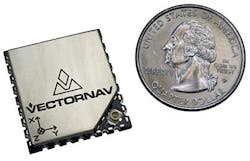MEMS-based GPS/INS navigation and positioning sensor for UAVs and robotics introduced by VectorNav
RICHARDSON, Texas, 27 July 2012. VectorNav Technologies LLC in Richardson, Texas, is introducing the VN-200 GPS-aided inertial navigation system (GPS/INS) on a surface-mount chip the size of a postage stamp to enable the next generation of aerospace, automotive, marine, entertainment, military, and robotics applications.
The VN-200 GPS/INS is suited for guidance, navigation, and control of unmanned aerial vehicles (UAVs) and other unmanned vehicles, camera and platform stabilization, targeting and positioning, robotics, pointing and attitude reference, military and maritime applications, flight control and simulation, and augmented reality applications.
The GPS/INS an advanced GPS module with micro-electro-mechanical-system (MEMS) inertial and pressure sensors to provide a coupled position, velocity. and attitude solution for a wide range of static and dynamic operating conditions.
Story continues below
Related stories
Breakthroughs in inertial sensors to augment GPS will guide future of precision-guided munitions
Thales to provide inertial navigation system and GPS for KC-390 military transport aircraft
Northrop Grumman to upgrade LN-251 navigation system software on the CH-53K helicopter.
The VN-200 onboard microprocessor runs an aerospace-grade Kalman filter algorithm at speeds as fast as 200 Hz and provides accuracies better than 0.25 degrees in pitch and roll and 0.75 degrees in heading.
Over the past few decades, the size, weight, power, and cost (SWaP-C) constraints of typical GPS/INS systems have limited the type and number of end-use applications. The advent of MEMS sensor technology created the potential to produce smaller, more compact and embeddable inertial navigation systems.
For more information contact VectorNav online at www.vectornav.com.
Follow Military & Aerospace Electronics and Avionics Intelligence news updates on Twitter

